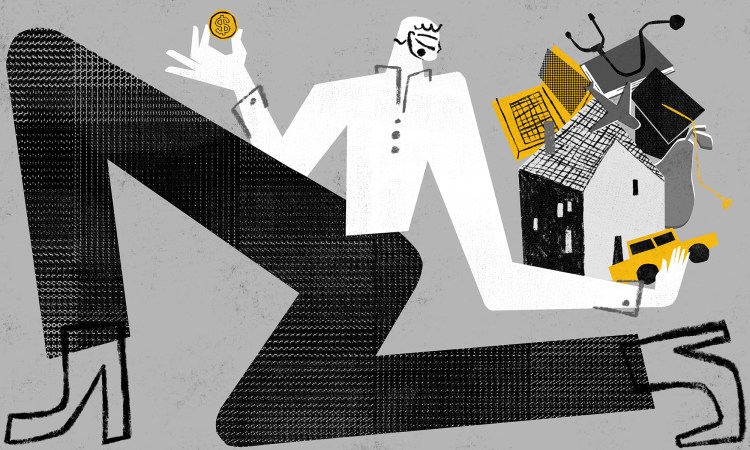
Since 2015, I’ve been President and CEO at PayPal, a company that focuses on the digital transfer of money and e-commerce. Our business model is driven by our mission: We want everyone — individuals, families, small businesses, retailers of all sizes — to have access to affordable, convenient and secure financial services. As a company, our employees and I have worked hard to deliver on this goal for customers and communities around the world. And we’ve felt even greater urgency now during the COVID-19 pandemic.
But while we were focused on fulfilling our mission in the larger world, we missed something that was going on inside our company. At PayPal, we make it a point to pay above-market salaries and offer generous benefits, and we assumed this was sufficient. But when we looked more closely, we saw that in some places and for some people, it just wasn’t enough.
For example, 65 percent of our customer-service and entry-level employees reported they were frequently running out of money between paydays. As a result, they had to make difficult trade-offs in educating their kids, paying for healthcare, and planning for the long term.
At times, they faced more heartbreaking situations. In 2017, we created an Employee Relief Fund to help people in case of a significant or unforeseen financial shock. One sign of trouble came from a trend that we saw in applications to this fund: We found urgent requests for help were increasingly the result of everyday events, like an unexpectedly steep medical bill, a student-loan payment or a car breaking down.
Knowing that our employees were struggling in this way was simply unacceptable. So, we decided to take some significant steps to shore up their financial security and health. There were four key elements to the Employee Financial Wellness Initiative that we announced at the end of 2019: 1) We reduced the cost of healthcare; 2) we reviewed and raised wages where appropriate; 3) we made everyone a shareholder and long-term beneficiary of our collective success as a company; and 4) we wrapped everything with a long-term financial education and planning program.
At the core of this program was a calculation called Net Disposable Income, or NDI. NDI is the amount of money that a person has left over after paying taxes and necessary living expenses, such as taxes, food, housing and transportation.
We began by reviewing current starting pay for our more than 23,000 global employees by location, taking into account their estimated cost of living and taxes. But we also wanted to go further and understand the impact of other key factors that were within our control as a company — factors like health insurance, long-term savings opportunities, even timing of when people were paid.
We looked at NDI in each of the different geographic locations in which we have employees, and we found that many of our entry-level and hourly employees had an NDI of 4-6 percent. In other words, at the end of every month, they had only this small percentage of their pay that wasn’t automatically going toward their essentials. If we want employees to fulfill our company’s mission and innovate and effectively deliver services, we simply can’t have them worrying how they’ll make ends meet every month or how they’ll cover the long-term needs of their families.
Ultimately, we decided to target an NDI of at least 20 percent. To drive an increase this significant, we needed to think more holistically and look at both their income and their costs. By far, the biggest cost driver for this portion of our workforce was healthcare. While we offered a generous health plan, it was generally the same price for everyone at the company. But this meant the lower a person’s income, the more expensive it was for them — and a higher percentage of their income. So, we lowered the cost of US healthcare benefits for hourly wage earners by an average of nearly 60 percent for employees for whom the cost of healthcare was too high.
After tackling wages and healthcare costs, a third step was to help employees save more and better prepare for the future. We chose to make everyone a shareholder and owner of PayPal, irrespective of level or position. We made one-time PayPal stock grants to anyone who hadn’t already received one, and we made everyone eligible to earn PayPal stock awards annually. I fundamentally believe that employee ownership of our company through stock is foundational to our success, because it gives every employee the opportunity to benefit from our performance and puts them all on the path toward building long-term savings.
Finally, we’ve launched a full suite of financial learning programs and counseling. As we all know, building and maintaining fiscal health requires continual learning, and it’s not a linear journey. Financial matters are complex, and we all need support along the way. We now offer coaching services, personalized consultations and other resources for all of our employees, and we’re continually exploring, evaluating and introducing new tools. Last but not least, we continue to maintain the Employee Relief Fund for urgent situations.
Of course, it will be a while before we learn the real impact of these changes and whether they’re sufficient in meeting people’s needs. We announced this program at the end of 2019, and we’re monitoring its progress.
But we’ve already started to see promising results, such as:
- A decrease in the number of employees who report they are running out of funds between pay periods
- An increase in healthcare benefit enrollment and employees upgrading their plans
- A higher rate of 401(k) and employee stock purchase plan enrollment
This has been a major undertaking, but it’s something we’d absolutely do again and encourage other companies to do as well. When we began this effort, I certainly didn’t expect to discover such a large gap between what we were providing for our employees and what they needed. Closing this gap has required a significant financial investment, but I believe it’s worth every dollar and every resource and that it’s been essential to making our workforce more resilient in the face of COVID-19.
Capitalism needs an upgrade — while I still think it’s the best system to stimulate innovation and commerce, it’s not working for a lot of people. The next generation of business leaders has an obligation to take action and do more, and prioritizing and investing in our employees is tangible and doable. If enough leaders and companies can make this difference for their own people, we can start to fix what has been broken.
Watch his TED conversation here:












